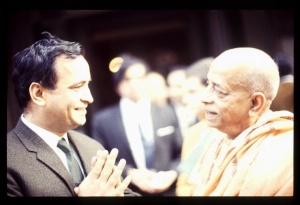SB 3.21.38-39
(Redirected from SB 3.21.39)

A.C. Bhaktivedanta Swami Prabhupada
TEXTS 38-39
- yasmin bhagavato netrān
- nyapatann aśru-bindavaḥ
- kṛpayā samparītasya
- prapanne 'rpitayā bhṛśam
- tad vai bindusaro nāma
- sarasvatyā pariplutam
- puṇyaṁ śivāmṛta-jalaṁ
- maharṣi-gaṇa-sevitam
SYNONYMS
yasmin — in which; bhagavataḥ — of the Lord; netrāt — from the eye; nyapatan — fell down; aśru-bindavaḥ — teardrops; kṛpayā — by compassion; samparītasya — who was overwhelmed; prapanne — on the surrendered soul (Kardama); arpitayā — placed upon; bhṛśam — extremely; tat — that; vai — indeed; bindu-saraḥ — lake of tears; nāma — called; sarasvatyā — by the River Sarasvatī; pariplutam — overflowed; puṇyam — holy; śiva — auspicious; amṛta — nectar; jalam — water; mahā-ṛṣi — of great sages; gaṇa — by hosts; sevitam — served.
TRANSLATION
The holy Lake Bindu-sarovara, flooded by the waters of the River Sarasvatī, was resorted to by hosts of eminent sages. Its holy water was not only auspicious but as sweet as nectar. It was called Bindu-sarovara because drops of tears had fallen there from the eyes of the Lord, who was overwhelmed by extreme compassion for the sage who had sought His protection.
PURPORT
Kardama underwent austerities to gain the causeless mercy of the Lord, and when the Lord arrived there He was so compassionate that in pleasure He shed tears, which became Bindu-sarovara. Bindu-sarovara, therefore, is worshiped by great sages and learned scholars because, according to the philosophy of the Absolute Truth, the Lord and the tears from His eyes are not different. Just as drops of perspiration which fell from the toe of the Lord became the sacred Ganges, so teardrops from the transcendental eyes of the Lord became Bindu-sarovara. Both are transcendental entities and are worshiped by great sages and scholars. The water of Bindu-sarovara is described here as śivāmṛta jala. Śiva means "curing." Anyone who drinks the water of Bindu-sarovara is cured of all material diseases; similarly, anyone who takes his bath in the Ganges also is relieved of all material diseases. These claims are accepted by great scholars and authorities and are still being acted upon even in this fallen age of Kali.